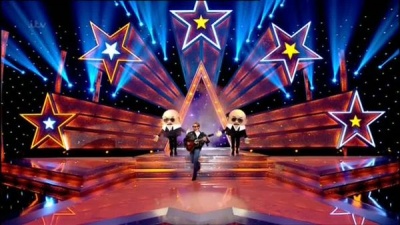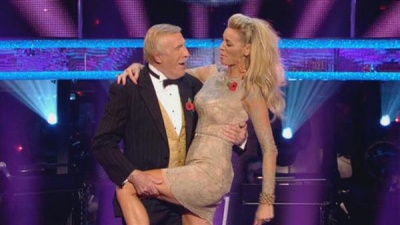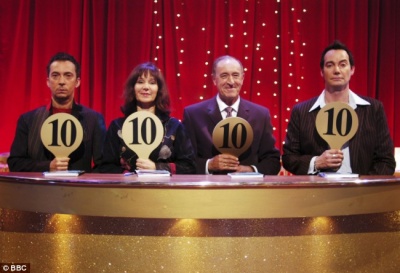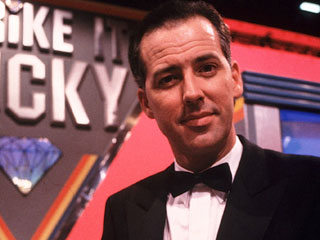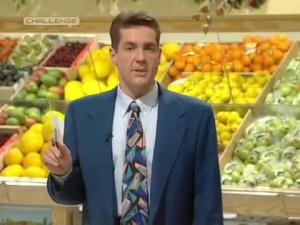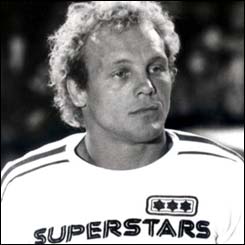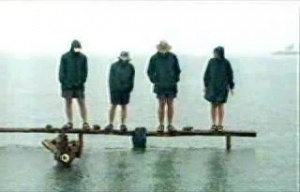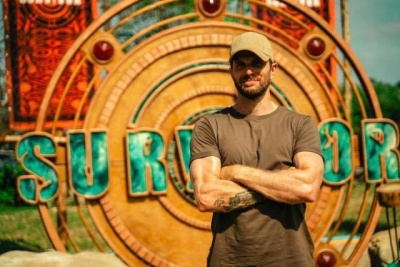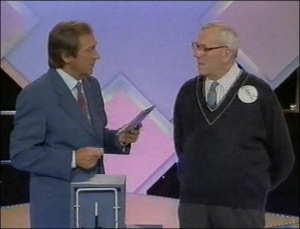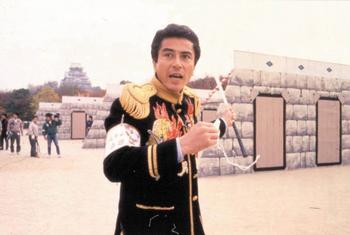Weaver's Week 2024-11-10
Last week | Weaver's Week Index | Next week
Another part of our long campaign to enumerate the game shows with the most episodes from 1924 to 2023. We're giving write-ups to shows with at least 500 episodes, and/or at least 100 primetime episodes.
This time: glitterballs, smokey doors, beeps, top-middle-or-bottom, yes-no, and some heavy action.
Contents |
Which game shows have had the most episodes? Part 17: SPO-TAK
Spot the Tune
Contestants had to provide a song title after only hearing a few bars of music from songstress Marion Ryan backed by the Peter Knight Orchestra. They rather had to make their own entertainment in the 1950s. 210 primetime episodes.
Stars in Their Eyes
Tonight, Matthew, I'm going to be a long-running game show.
Five people who think they sound like a musical star talk to Matthew about their job, their life, though curiously never about their side hustle as a Chesney Hawkes impersonator. They then go through the "star door" and (kaboom!) after a few dry ice clouds they suddenly become the star of their choosing. At the end of the show, the audience votes for whoever they thought was best, the winners going through to the live grand final.
A mainstay of ITV's schedules from 1990 to 2006, by which time they'd surely had every cruise ship performer and pub singer in the land. And by which time The X Factor had stolen most of their good slots. 215 episodes, plus 34 in the children's series and they couldn't keep a good series down.
Recommissioned in 2015 for a comedy series with Harry Hill – "it won't change your life, but it won't ruin it either", but just 6 episodes. Came back again in 2022 as Starstruck, with not one, not two, but three Chesney Hawkeses at the same time! 15 episodes in the two series.
That's a total of 270 primetime episodes.
Streetmate saw Davina McCall travel the country, trying to set people up on possible dates. Sometimes they'll like each other, sometimes they won't. 66 episodes, they've had one revival, and we suspect someone's going to bring it back again.
Strictly Come Dancing
A bunch of non-dancing celebs attempt to learn a series of dances, perform them on a live Saturday night show, get insulted by a panel of judges, and face a public phone vote to decide who gets booted off each week.
The most popular show on telly every year began as a summer experiment, host Bruce Forsyth was surprised at how seriously everyone took it. Hard work makes great television, and Strictly has become the BBC's showcase light entertainment programme: great camerawork, high-quality hosting, Dave Arch and his Lovely Lovely Orchestra. It's always been very visual, the emphasis is on the dance and movement, not on the singing like every other Saturday night contest of the time.
460 main series episodes, plus 20 Christmas specials, 5 for Sport Relief, 12 for Children in Need, one each of The People's Strictly, Strictly Ice Dancing, and Strictly African Dancing.
There's been a spin-off show from the start – originally Strictly Come Dancing on Three (9 episodes), promoted to BBC2 for the second series where it's remained ever since. No fewer than 1135 episodes on the second channel to the end of 2023.
That gives a grand total of 1644 primetime episodes.
Strike it Lucky
Three teams of couples attempted to beat each other, Michael Barrymore, and the Hot Spots by answering questions correctly and guessing well. Some nights we're interested in difficult questions, some nights we just want to veg out, and few shows are as entertaining and as mindless as this.
155 episodes in the original series, plus 54 as Strike it Rich in the late 90s. Revived for four episodes in the Epic Gameshow series, which proved Alan Carr is nowhere near as natural as Michael Barrymore.
213 primetime episodes.
Supermarket Sweep
Dale Winton asks incredibly easy questions, and gets people to solve anagrams like GREAP to earn time. That time is translated into a dash round a supermarket in the studio, grabbing as much as they can. Best in this run can try for the big cash prize.
Another of Al "Sale of the Century" Howard's formats. It's undemanding viewing, and stripped across the 9.25 after-breakfast slot for four months in the autumn. Four months allowed it to build a following – student houses up and down the land would watch this show, and made Dale into an unlikely cult figure. Really came into its own in the second series, when Dale got the courage to play the show his way.
Came off air in 2001, perhaps to leave us wanting more. A revival in 2007 was the era when ITV didn't have a clue how to run a channel, and dotted about the schedules. (A firmer hand on the tiller could have meant Supermarket Sweep ran forever, and The Chase never got to be summer filler.) Rylan hosted another revival in 2019, and we have a nagging feeling that the next comeback is due in about four years' time.
There were 549 episodes in the original run, 60 in the aughts revival, with 25 daytime and 20 primetime eps in the more recent comeback. That's a total of 654 episodes.
Superscot
Quiz about Scottish history and culture. The series made 120 primetime episodes from 1983 to 1991 (the last in a family team version, like Telly Addicts). Revived for four shows on Radio Scotland in the early 2010s.
The Superstars
Marvellous sporting competition where the nation's favourite sports stars battle to find out who is the best all round sporting athlete. Or: can anybody beat Brian Jacks at the gym tests?
First appeared on Easter Monday 1973, highlights from the American version they'd made earlier in the year. One-off shows in '73 and '74, then a European contest from 1975 to 1977. World Superstars and The Women Superstars began in 1977, and there was a full domestic series from 1979. Winners of the European final went through to World Superstars, though the subsequent match against Zarb's top athletes was not shown on our television screens. Junior Superstars began in 1981, an early appearance for top skiier Martin Bell. Superteams had begun in 1978, and we're going to count this in with the individual contest.
The original series had 83 primetime episodes until it was ended in 1985: clearly The Superstars cannot exist on the same station as The East Enders. Revived on the BBC in the early aughts, on Channel 5 in 2008, and a one-off Superstars 2012. We wouldn't be surprised if there are further one-off revivals. 105 primetime episodes.
Survivor was ITV's massive new series for summer 2001. It's the most gripping programme on television! You can trust nobody! Sparks will fly! Tempers will flare! You don't win, you survive! "Naah," though the Grate British Public, who clicked over to watch the chickens on Channel 4's Big Brother. 14 competition episodes, and 14 interview editions with John Leslie.
The network tried again in spring 2002. A spot straight after the Champion's League meant the show didn't start till gone 10pm, and suffered from particularly erratic scheduling. 12 competition episodes, plus 12 editions of Survivor Colon Raw and 11 interview shows Survivor Colon The Last Word. After this series also flopped, ITV gave the show up as a bad job. And we never ever saw it again.
Until Survivor Oh Good Grief Not This Again, which stunk out BBC1's weekends in autumn last year. 16 episodes, and no spin-off shows. Lots of standing around doing nothing. A host who cannot go beyond "say what you see" as though he's auditioning for Catchphrase. Bad production: the show looked like it would be Big Dumb Challenges On A Beach, they voted out most of the women, editing didn't build stories across the series. Survivor is an international hit, and it felt like they hadn't adapted it for people who'd never seen it before.
Which is odd, because Survivor traces itself back to a two-week insert into Channel 4's youth magazine programme Network 7. Including those two editions, we get 81 episodes, 79 of them in primetime.
Swashbuckle probably deserves a longer write-up than we've given Survivor. It's well-plotted, it's funny, there is a clear message, and the winner is in doubt right to the end. Shame the food is better on Survivor. They made 208 episodes for the Cbeebies channel from 2013 to 2022, and will doubtless repeat those episodes into infinity. Swashbuckle cheer – arrrrrr!
Take a Letter (1)
Another show about which we know very little. Bob Holness hosted from Granada's studios, there was a top prize of 1000, and 128 primetime episodes between 1962 and 1964. But we've no clue what happened in the game, or even if it was different from Take a Letter (2), which had 50 episodes on the Living channel in 1997.
Take It or Leave It (1) was a literary detective quiz on BBC2 in the sixties; 64 primetime episodes. Take It or Leave It (2) was a this-or-that quiz with a twist: accept the first answer, or reject it and be lumbered with the other. 91 primetime episodes on the Challenge channel in the late aughts.
Take Me Out
Paddy McGuinness invites lots of young women to assess the charms of a young man, with the prospect of going out on a date to a restaurant just round the corner.
Ran through the teens: 110 primetime episodes on the main ITV channel, plus 14 webcast spinoff shows, and 70 on ITV2. That makes a total of 194 primetime episodes.
Take Your Pick
So, first there's the yes-no interlude, where the host snaps out questions and you've to respond without saying yes, or no, or nodding, or shaking your head, or pausing, or repeating yourself. Best performers come back on, have a lovely chat, and are asked up to three patronisingly easy questions.
Then the player gets to pick a box, any one of the ten boxes. In the box is a prize – it could be a new dishwasher, it could be a new dishcloth. Our host doesn't know what's in the box, and will offer money to buy back the key. Will you sell the key for £30? £70? £100? Shouts of "Take the money!" "Open the box!" from the audience as the player decides. The actual reveal is almost an anti-climax.
Originally hosted by Michael Miles and ran almost continuously from 1955 until 1968, and only ended when Associated-Rediffusion were taken off air; 494 primetime episodes there. Revived in the 1990s with Des O'Connor at his most unctious, 70 primetime episodes. Came back in the Gameshow Marathon series, and as one of the few clear successes of Epic Gameshow.
A total of 567 primetime episodes.
Takeshi's Castle
The international language of "ouch", "oof", "crump", and "ba-y-y-ong". Filmed in Japan between 1986 and 1990, we first saw Takeshi's Castle through Tarrant on TV, Chris Tarrant's examination of the world's more bizarre shows.
Came back to attention in late 2002, when the Challenge channel got Craig Charles to commentate on some heavily edited challenges, with the emphasis on slapstick, falls and spills and thrills. Proved very popular – indeed, so popular that we have difficulty working out when one series ended and the next began. We believe there were about 80 short episodes, plus five hour-long editions and one The A-Z of Takeshi's Castle. That'll be 86 primetime episodes.
Dick and Dom gave a new commentary to previously unseen clips in 2013 (6 primetime episodes). A revival on the Comedy Central channel from 2017-20 gave us another 80 primetime episodes. Last year there was a streaming version voiced by Tom Davis and Romesh Ranganathan (8 episodes).
As there's been some effort to produce new content, and the shows aren't a straight import, we'll count them. Approximately 180 primetime episodes.
We plan to review Romesh Ranganathan's Parents' Evening next week, and then it's Junior Eurovision.
In other news
RTS Craft Awards: we have nominations.
- In the Lighting for Multicamera category, it's Gladiators (Nigel Catmur, Joe Phillips, Oliver Lifely & Martin Higgins) versus The Traitors (James Tinsley).
- Gladiators (specifically Jacqui Mallett) could also win in Make Up Design Non-Scripted;
- The Traitors camera team are up in Multicamera Work.
- Taskmaster (James Dillion) is up in Production Design Non-Scripted.
- Finally, in the Production Management category, Race Across the World and Squid Game The Challenge are up for the gong.
Winners will be named next month.
House of Games (3) We can whisper it in awed reverence, we can shout it from the rooftops. Jay Rayner won all of this week's House of Games editions, a feat previously achieved by Angela Barnes and nobody else. Jay was pushed close by Iwan Thomas (sprinter), who was almost as good as Iwan Thomas (reigning Going for Gold champion).
Blobwatch A couple of weeks ago, we noted the mysterious blobs being washed up on the coast of Newfoundland. To no major surprise, they're man-made pollution – some sort of PVA adhesive that was released into the ocean, and coagulated into a semi-solid form.
Quizzy Mondays
John Harden was the winner on Mastermind; he achieved a Perfect Round on his specialist subject of Red Rum, and was able to pick off enough correct answers to win by two clear points. Credit to Laura Rutherford, one question off perfection on The West Wing and with a brisk general knowledge; she'll be one to watch if she chooses to re-apply.
Sprouters made the quarter-finals on Only Connect, beating the Al Frescans by 27-19. Sprouters took the lead in the opening round, claiming two on all of their own questions, and a bonus to boot. The lead extended in Sequences, though Al Frescans brought it back by a point in Missing Vowels. Spot of the night was a picture sequence of Beyoncé albums, closely followed by the summoning order for The Fairies in A Midsummer Night's Dream. Takes all sorts to win this show...
LSE won the penultimate heat of University Challenge, beating Leicester by 235-100. Bonus conversion rate of precisely two-thirds, the fifth side to hit the exact mark; overall accuracy was 62% puts them in the top half of sides. LSE did well on arts subjects, but quite weak on the plethora of science questions. Leicester started brightly, and briefly held the lead, but scored just one bonus after that spell. St Andrews' are certainly back in the repêchage.
Children in Need week is marked with a celebrity Interior Design Masters (BBC1, Tue) and the big telethon on Friday. Bargain Hunt celebrates Doctors and does a Children in Need special (BBC1, Thu, Fri).
Harry and Paul from The Traitors do Antiques Road Trip (BBC2, Wed). It's the final of BBC New Comedy Award (BBC1, Wed) and of Big Brother (VM2 and ITV2, Fri). Junior Eurovision Song Contest is back (jesc.tv, Sat) Another chance to see Beat the Pack with Jake Humphrey (BBC2, weekdays); don't think we've seen this since 2013.
To have Weaver's Week emailed to you on publication day, receive our exclusive TV roundup of the game shows in the week ahead, and chat to other ukgameshows.com readers, sign up to our Google Group.

